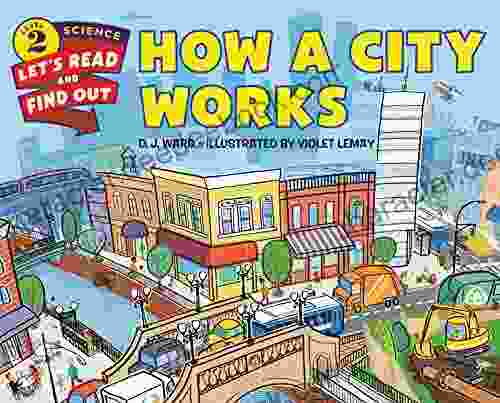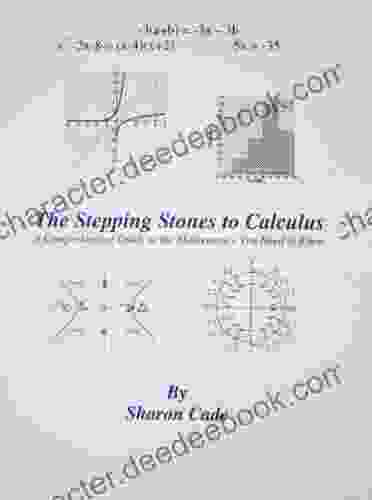The Stepping Stones to Calculus: A Comprehensive Guide

Calculus, a branch of mathematics that deals with change, is an essential tool for many fields, including science, engineering, and economics. While calculus may seem like a complex and daunting subject, it is built upon a series of foundational concepts and principles that can be understood through a step-by-step approach.
4.7 out of 5
| Language | : | English |
| File size | : | 32033 KB |
| Text-to-Speech | : | Enabled |
| Enhanced typesetting | : | Enabled |
| Print length | : | 255 pages |
| Lending | : | Enabled |
| Screen Reader | : | Supported |
The Precalculus Foundation
Before delving into calculus, it is important to have a solid understanding of precalculus, which provides the necessary foundation for calculus. Precalculus topics include:
- Functions: A function is a relation that assigns to each element of a set a unique element of another set. Functions are often represented graphically or algebraically.
- Limits: A limit describes the behavior of a function as the input approaches a specific value. Limits are used to define derivatives and integrals.
- Derivatives: A derivative measures the instantaneous rate of change of a function. Derivatives are used to find the slope of a tangent line to a curve and to optimize functions.
- Integrals: An integral represents the area under the curve of a function. Integrals are used to find the volume of solids and to calculate the work done by a force over a distance.
The Building Blocks of Calculus
Calculus is built upon the following fundamental concepts:
- The real number system: The real number system is the set of all real numbers, which includes rational numbers (e.g., 1/2, 3.14) and irrational numbers (e.g., √2, π). Calculus relies heavily on the properties of the real number system.
- Functions: Functions are the building blocks of calculus. A function is a relation that assigns to each element of a set a unique element of another set. Functions can be represented graphically, algebraically, or verbally.
- Limits: A limit describes the behavior of a function as the input approaches a specific value. Limits are used to define derivatives and integrals.
- Derivatives: A derivative measures the instantaneous rate of change of a function. Derivatives are used to find the slope of a tangent line to a curve and to optimize functions.
- Integrals: An integral represents the area under the curve of a function. Integrals are used to find the volume of solids and to calculate the work done by a force over a distance.
The Calculus Toolkit
Calculus provides a powerful toolkit for solving complex mathematical problems. The following are some of the most important tools in the calculus toolkit:
- The derivative: The derivative is a function that measures the instantaneous rate of change of another function. Derivatives are used to find the slope of a tangent line to a curve, to maximize and minimize functions, and to solve related rates problems.
- The integral: The integral is a function that represents the area under the curve of another function. Integrals are used to find the volume of solids, to calculate the work done by a force over a distance, and to solve other problems involving continuous change.
- The chain rule: The chain rule is a formula that allows you to find the derivative of a composite function, which is a function that is made up of two or more other functions. The chain rule is used extensively in calculus.
- The product rule: The product rule is a formula that allows you to find the derivative of a product of two functions. The product rule is used frequently in calculus.
- The quotient rule: The quotient rule is a formula that allows you to find the derivative of a quotient of two functions. The quotient rule is used less frequently than the product rule, but it is still an important tool in calculus.
Applications of Calculus
Calculus has a wide range of applications in many different fields, including:
- Science: Calculus is used to model and analyze a wide variety of physical phenomena, such as motion, heat transfer, and fluid flow.
- Engineering: Calculus is used to design and analyze structures, machines, and systems.
- Economics: Calculus is used to model and analyze economic phenomena, such as production, consumption, and investment.
- Finance: Calculus is used to model and analyze financial markets and instruments.
- Medicine: Calculus is used to model and analyze biological systems, such as the human body.
Calculus is a powerful and versatile mathematical tool that has applications in a wide range of fields. By understanding the fundamental concepts and principles of calculus, you can unlock the power of this subject and use it to solve complex problems and gain a deeper understanding of the world around you.
4.7 out of 5
| Language | : | English |
| File size | : | 32033 KB |
| Text-to-Speech | : | Enabled |
| Enhanced typesetting | : | Enabled |
| Print length | : | 255 pages |
| Lending | : | Enabled |
| Screen Reader | : | Supported |
Do you want to contribute by writing guest posts on this blog?
Please contact us and send us a resume of previous articles that you have written.
 Novel
Novel Page
Page Chapter
Chapter Paperback
Paperback E-book
E-book Magazine
Magazine Newspaper
Newspaper Paragraph
Paragraph Sentence
Sentence Glossary
Glossary Bibliography
Bibliography Foreword
Foreword Preface
Preface Synopsis
Synopsis Footnote
Footnote Manuscript
Manuscript Scroll
Scroll Codex
Codex Bestseller
Bestseller Biography
Biography Memoir
Memoir Encyclopedia
Encyclopedia Thesaurus
Thesaurus Narrator
Narrator Resolution
Resolution Librarian
Librarian Catalog
Catalog Card Catalog
Card Catalog Stacks
Stacks Periodicals
Periodicals Study
Study Scholarly
Scholarly Academic
Academic Journals
Journals Special Collections
Special Collections Interlibrary
Interlibrary Study Group
Study Group Dissertation
Dissertation Awards
Awards Reading List
Reading List Tony Abbott
Tony Abbott Nina Montgomery
Nina Montgomery Alynna J Lyon
Alynna J Lyon Colin Stanley
Colin Stanley Alydia Rackham
Alydia Rackham Susan Keefe
Susan Keefe Sean O Connell
Sean O Connell Cathy Linh Che
Cathy Linh Che Lilac Mills
Lilac Mills Denise Layman
Denise Layman Hal Vaughan
Hal Vaughan Gemma Denham
Gemma Denham Julia Spiro
Julia Spiro Michael Robinson
Michael Robinson Aldo Madariaga
Aldo Madariaga Carl Weber
Carl Weber Jonathan J Dutton
Jonathan J Dutton Hilary Bradt
Hilary Bradt Robert Cribb
Robert Cribb Spencer Quinn
Spencer Quinn
Light bulbAdvertise smarter! Our strategic ad space ensures maximum exposure. Reserve your spot today!
 Dennis HayesFollow ·14.4k
Dennis HayesFollow ·14.4k Jerry WardFollow ·10.1k
Jerry WardFollow ·10.1k Terry PratchettFollow ·8.5k
Terry PratchettFollow ·8.5k Gary ReedFollow ·19.3k
Gary ReedFollow ·19.3k Ethan GrayFollow ·19.5k
Ethan GrayFollow ·19.5k Elmer PowellFollow ·17.4k
Elmer PowellFollow ·17.4k Guillermo BlairFollow ·9k
Guillermo BlairFollow ·9k Clarence BrooksFollow ·18.4k
Clarence BrooksFollow ·18.4k

 Ronald Simmons
Ronald SimmonsHow Do Cities Work? Let's Read and Find Out!
Cities are...

 Tom Clancy
Tom Clancy25th European Symposium on Research in Computer Security...
<p>Guildford,...

 Lawrence Bell
Lawrence BellHow We Decide: Cognitive Behavior in Organizations and...
Organizations are...

 E.M. Forster
E.M. ForsterOver 60 Little Masterpieces To Stitch And Wear:...
Embark on a Creative...

 Douglas Foster
Douglas FosterUnveiling the Educational Treasure: CGP KS2 Geography:...
In the ever-evolving educational...
4.7 out of 5
| Language | : | English |
| File size | : | 32033 KB |
| Text-to-Speech | : | Enabled |
| Enhanced typesetting | : | Enabled |
| Print length | : | 255 pages |
| Lending | : | Enabled |
| Screen Reader | : | Supported |














